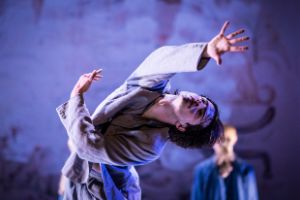
Béla Bartók © N.N.
Béla Bartók
Béla Bartók (1881 – 1945) is a composer who cannot easily be pigeonholed. It is true that Bartók was at the same time an expressive musician and a constructivist, simultaneously a decisive progressive and a cautious conservative, and ultimately a composer of refined serious music who nevertheless drew inspiration from the music played in remote villages. In his works, a specific musical rationality, a structure consisting of miniature motivic cells and his exploration of symmetric scales all play a significant role.
Bartók grew up in a household of enthusiastic amateur musicians. He received initial piano lessons from his mother before subsequently being taught by a variety of piano teachers and gradually developed the idea of becoming a professional pianist. His compositional activities were given a boost in 1902 after the successful performance of a symphonic poem inspired by Richard Strauss, followed by a period of exploration. When Bartók was offered a professorship in piano in Budapest in January 1907, he accepted the position and settled in the city where he taught at the Music Academy up until 1934.
Shortly before this appointment, he had experienced his first encounter with genuine Hungarian folk music in the summer of 1906. From this point onwards, an academic preoccupation with Eastern European folk and peasant music would take up a significant position in Bartók’s life. Between 1906 and 1918, he collected around 10 000 melodies, primarily originating from a variety of regions within the then existing territory of Greater Hungary.
His encounter with folk music was followed by a creative breakthrough. Bartók initially developed his own inimitable style in his piano works composed from 1908 onwards such as the “Allegro barbaro”. His artistic path was stony, accompanied by self-doubt and creative crises and oscillating between success and disappointment. It was not until the 1920s that Bartók became widely considered as a leading composer. The year 1926 can be seen as representing a parting of the ways in his creative life: while compositions prior to this date tended towards Expressionism, those composed subsequently gave a more well-considered impression and were oriented to a greater degree towards traditionally handed-down forms.
The rise of National Socialism in Germany and the increasing power of the political right in Hungary filled Bartók with profound concern. He decided to leave his native country despite being unlikely to be directly confronted with persecution, emigrating to the USA in October 1940. His final years were bitter; he settled in New York and experienced extreme difficulties in gaining a foothold in musical life, resulting in a creative crisis. He only resumed composing in 1942, producing works exclusively in response to commissions, such as the “Concerto for Orchestra”. The music from this period possesses a confessional character, veering between deep desperation and ostentatious joy and optimism. Having suffered from leukaemia since 1942, Bartók died in New York on 26 September 1945.
As of: February 2025